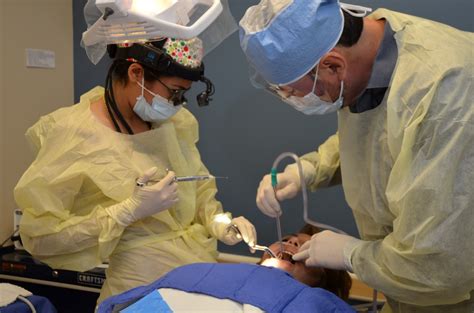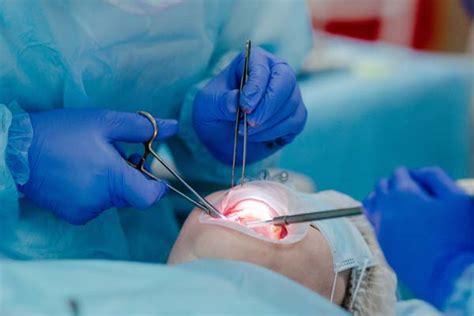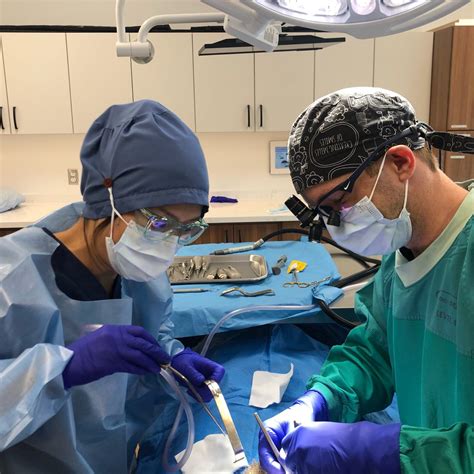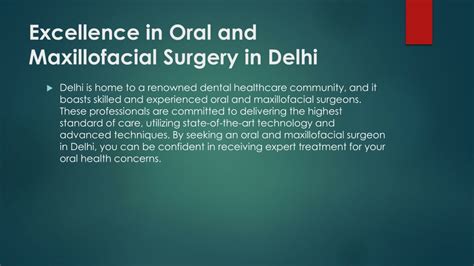Military
Oral Maxillofacial Surgical Expertise

Introduction to Oral Maxillofacial Surgery

Oral maxillofacial surgery is a specialized field of dentistry that focuses on the diagnosis, surgical treatment, and management of disorders and conditions affecting the mouth, jaw, face, and surrounding tissues. Oral maxillofacial surgeons are trained to perform a wide range of surgical procedures, from simple tooth extractions to complex reconstructive surgeries. Their expertise is essential in addressing various issues, including dental and facial deformities, traumatic injuries, and cancerous tumors.
Scope of Oral Maxillofacial Surgery

The scope of oral maxillofacial surgery is broad and diverse, encompassing various procedures and treatments. Some of the key areas of expertise include: * Dental implantology: placement of dental implants to replace missing teeth * Orthognathic surgery: surgical correction of jaw deformities and misalignments * Cleft lip and palate repair: surgical reconstruction of cleft lip and palate defects * Temporomandibular joint (TMJ) surgery: surgical treatment of TMJ disorders and injuries * Facial trauma surgery: treatment of facial injuries, including fractures and lacerations * Oral pathology: diagnosis and treatment of oral cancer and other diseases
Training and Qualifications

Oral maxillofacial surgeons undergo extensive training and education to acquire the necessary skills and knowledge. Their training typically includes: * Completion of a doctoral degree in dental surgery (DDS) or doctor of dental medicine (DMD) * Completion of a residency program in oral maxillofacial surgery, which can last from 4 to 6 years * Obtaining board certification from the American Board of Oral and Maxillofacial Surgery (ABOMS) * Maintaining continuing education and staying updated on the latest techniques and advancements in the field
Advancements in Oral Maxillofacial Surgery

The field of oral maxillofacial surgery has witnessed significant advancements in recent years, driven by technological innovations and research. Some of the notable developments include: * Computer-aided design (CAD) and computer-aided manufacturing (CAM): allowing for precise and customized surgical planning and implant placement * 3D printing and biomaterials: enabling the creation of customized implants, prosthetics, and surgical models * Minimally invasive surgery: reducing trauma and promoting faster recovery times * Robotic surgery: enhancing precision and dexterity in complex surgical procedures
Benefits of Oral Maxillofacial Surgery

Oral maxillofacial surgery offers numerous benefits to patients, including: * Improved function: restored chewing, speaking, and swallowing abilities * Enhanced aesthetics: improved facial appearance and self-esteem * Relief from pain: alleviation of chronic pain and discomfort * Increased quality of life: improved overall well-being and confidence
💡 Note: It is essential to consult with an oral maxillofacial surgeon to determine the best course of treatment for individual needs and conditions.
Conclusion and Future Directions

In conclusion, oral maxillofacial surgery is a vital and complex field that requires specialized expertise and training. As technology continues to evolve and advance, oral maxillofacial surgeons will play an increasingly important role in addressing various dental and facial issues. By staying at the forefront of innovation and research, these surgeons will be able to provide patients with the best possible care and outcomes.
What is the role of an oral maxillofacial surgeon?

+
An oral maxillofacial surgeon is a specialized dentist who is trained to perform surgical procedures related to the mouth, jaw, face, and surrounding tissues.
What are some common procedures performed by oral maxillofacial surgeons?

+
Common procedures include dental implant placement, orthognathic surgery, cleft lip and palate repair, and facial trauma surgery.
How do I find a qualified oral maxillofacial surgeon?

+
Look for a surgeon who is board-certified by the American Board of Oral and Maxillofacial Surgery (ABOMS) and has experience in the specific procedure you need.